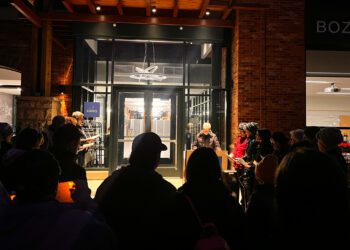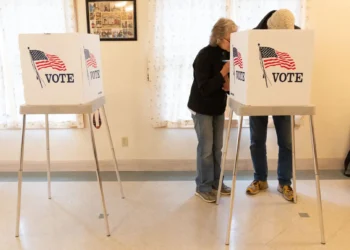By Gabrielle Gasser EBS STAFF
BIG SKY – As consumers, we all try and do our part and recycle our disposable plastic containers by #1 and #2 in the green bins, but then what—what actually happens to plastic after we recycle it?
The film “The Story of Plastic” takes a deep dive into the history of plastic production and documents the journey plastic goes through before it reenters the ecosystem and becomes a pollutant. The film is directed by Montana State University alumna Deia Schlosberg and it is available to stream free March 21 through the 28 courtesy of Gallatin Valley Earth Day.
GVED has partnered with the film’s creators and supporters to arrange this free virtual screening as well as a Q&A with Schlosberg on March 25.
These virtual events are just two of many planned in March and April as part of GVED’s event series “Gallatin Valley 2040” inspired by the 2019 documentary “2040,” an upbeat look at how the climate crisis can be addressed and Earth improved by the year 2040. The monthly event series aims to help attendees imagine, explore and work towards a brighter, healthier, vibrant 2040.
GVED is an organization of volunteers started by Anne Ready in 2019. Ready grew up on a small farm in the Midwest and later moved to Pennsylvania, eventually landing in Bozeman in 2015. After retiring from computer programming, she became active in volunteering for climate change advocacy and recognized the need for an Earth Day celebration
in Bozeman.
After having to cancel 2020’s events due to concerns over COVID-19, the Gallatin Valley Earth Day Festival will return this year on April 17 with the theme of transforming and healing our earth together.
“We really want to inspire people to envision a very bright future,”
Ready said.
The virtual screening of “The Story of Plastic” is one of several events planned by the organization in the lead up to Earth Day. The film presents a cohesive timeline of the current plastic pollution crisis and how the narrative around this issue has been hijacked by the oil and gas industry.
The film is presented by The Story of Stuff Project, a nonprofit dedicated to changing the way we make, use, and throw away stuff. During the hour-and-a-half film, viewers will learn about the discovery of plastic by the oil and gas industry all the way to the present-day crisis.
According to the film, while there are recycling programs in place to manage plastic waste, they are expensive, and most plastic is only recycled once before ending up in a landfill. Furthermore, the film explains that most plastic is downcycled and only two percent is effectively recycled meaning what is made with it is just as useful as the original product.
The systemic issue of plastic is revealed in the film as it explores different solutions that have been implemented including shipping plastic waste to other countries like Vietnam. It is pointed out that most media coverage focuses on the issue when plastic is already pollution showing it in the ocean or piled in landfills. While clean ups are necessary, the film says they are not a solution and suggests a redirection of resources to changing our production and use of plastics.
Some solutions offered include extended producer responsibility, which would transfer responsibility of waste back to the manufacturer, zero waste programs and research into bioplastic as a better option.
The March 25 virtual event will offer viewers to chance to talk with Schlosberg, learn more about the issues in the film and about what is going on in the Gallatin Valley.
As part of the Earth Day efforts this year, GVED partners have gone out and asked all grocery stores in the Gallatin Valley to give away reusable cloth grocery bags to help reduce the number of plastic bags being used. According to Ready, Smith’s and Walmart are already on board and they are waiting to hear back from other stores in the valley.
“We want to show that there is positive stuff going on our community,” Ready said of the efforts.
In addition to a Q&A with the director, GVED organized another virtual presentation on March 30 to teach the community about local recycling efforts. Alexis Alloway of Republic Recycling will be presenting on where locally recycled items go and what really happens to the recycling.
The Earth Day Festival this year will take place on the Bozeman Public Library lawn and feature live music, food trucks, exhibitors and wildlife groups. Ready said that they will be taking appropriate COVID-19 precautions at the event by requiring masks and directing the flow of traffic one way through all the different stations.
“It’s very exciting but also very intense right now,” Ready said. “People were so excited about the event last year, and we had 50 organizations involved and everyone’s chomping at the bit to do something this year.”
Luckily, the celebration won’t stop on Earth Day.
GVED has a full docket of events planned from March through the end of April. In addition to those discussed above, there will be a screening of “2040,” a presentation on wind energy from MSU professor Robb Larson,
a talk on the effects of climate change on the Greater Yellowstone Ecosystem by Dr. Cathy Whitlock, and Earth Day in the park among many other great events.
Ready discussed the importance of this event series in the time of a
global pandemic.
“I think everyone’s realized with COVID [that] taking care of our earth is so important for both our mental and physical health,” she said. “It’s very important for people’s mental health to have wilderness and wildlife to go out and hunt or take pictures out there but wilderness and public lands
are essential.”
Ready is excited to share all of these events with the residents of Gallatin Valley and urges the importance of this awareness, now more than ever.
“Everyone, regardless of what team red or blue team they’re on, I think everyone cares about clean air and clean water,” she said. “By switching over to a new energy economy, it will mean healthier air, healthier water and enough water.”
Visit gallatinvalleyearthday.org to access the film and for the full schedule
of events.











